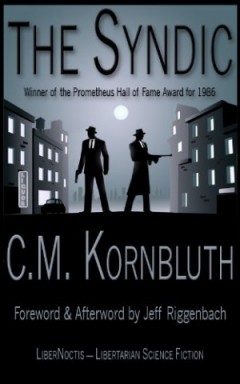
Get it for free in epub and mobi formats!
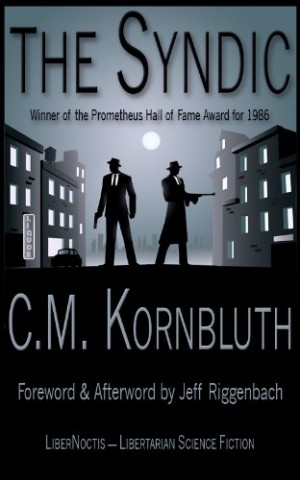
“What ifs” are the bread and butter of science fiction. What if organized crime overthrew the United States government and took over? What would life be like under the mafia? Would the people of North America be better off? These are the questions C.M. Kornbluth sought to answer in his science-fiction novel The Syndic (1953).
The Syndic is of interest to libertarians, not least because it was honored with the Prometheus Hall of Fame Award in 1986 by the Libertarian Futurist Society. This edition of the novel includes a forward and an afterward by Jeff Riggenbach that set the historical context for Kornbluth’s work and life and their relevance to libertarians. The Syndic is a fast-paced, entertaining tale replete with insights into the nature of the state and of war. Indeed, it could arguably be deemed an antiwar novel; but the insights do not end there.
As The Syndic opens, the continent of North America has long been divvied up between the Syndic and the Mob. The former United States government continues to exist in exile in Iceland and Ireland as the North American Government (NAG; an apt acronym). After an odd prologue composed of historical documents that set the stage for us, we’re introduced to our main viewpoint character, Charles Orsino, a low-ranking young bagman for the Syndic, who spends his days politely shaking down small businesses in the 101st New York Police Precinct for protection money and playing a brutal version of polo with jeeps and firearms instead of horses and mallets.
[continue reading…]
Help Promote Prometheus Unbound by Sharing this Post
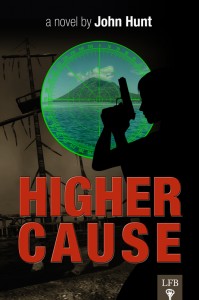
This review is part of a series covering each installment of the serialized novel Higher Cause, written by John Hunt and published by Laissez Faire Books. To catch up, start with the announcement, the book’s link-rich table of contents, and the first review.
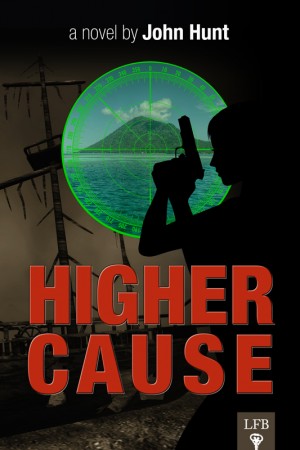
We start out the second half of the book with two more chapters. Hunt is starting to benefit from the seeds planted in earlier chapters. There is a lot going on, a lot of side plots and characters to worry about, and as each advances, they give us that mild euphoria that comes from a new development or a new clue revealed. With so much to work with, these developments and clues come tumbling out of the prose at us.
The first chapter begins with some medical care for Jeff Baddori. It catches us up to date with Dr. Thomas Standall, whom we met earlier. The research done into the wounds that Jeff and Petur received adds a lot to the narrative. It also allows for some pro-market explanations. I would have omitted the first three paragraphs and had the information therein come out as dialogue though.
The second part of the first chapter is a bracing search for the bad guys. This time, something is found. It’s a stimulating little stretch of prose and leaves us with the certainty of trouble ahead.
The second chapter deals with Onbacher’s theories about the Bounty. He has made some progress in his own search, which he confesses was, initially, his principle interest in The Island. The novel has a lot of appealing aspects, and this is one of the main ones. It takes a historical fact, fills in a lot of gaps with some real imagination and then connects it all to the present narrative, which does not have to have anything to do with it. It could survive quite well on its own, but the addition of the historical fiction enriches the tale.
[continue reading…]
Help Promote Prometheus Unbound by Sharing this Post
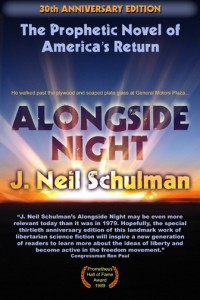
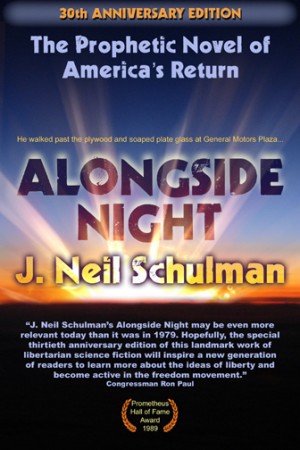
I’m a little late with this post and I completely failed to send out the voting results email via our newsletter last month. All I can say right now is that I’ve been rather preoccupied with some momentous events for the site. First, I upgraded from shared hosting to a virtual private server (VPS) at DreamHost even though we’re not yet bringing in enough revenue to cover the significantly added cost. We’d simply outgrown shared hosting; the site was loading slowly and often failed to load at all, especially on the backend while trying to save and publish posts. Second, the new version of the theme I designed this site with, Thesis 2.0, was just released on the 1st. It’s a radically redesigned and powerful theme framework and I’ve been obsessed with scaling its steep relearning curve and redesigning Prometheus Unbound on it. Stay tuned for Prometheus Unbound 2.0. It’s gonna be awesome, if I do say so myself.
But enough with excuses… For the month of October, we are reading and discussing J. Neil Schulman’s classic dystopian science fiction novel Alongside Night, winner of the Prometheus Hall of Fame Award and currently being adapted into a movie starring Kevin Sorbo (Hercules, Andromeda):
The American economy is experiencing a systematic meltdown. The country is turning into a totalitarian police-surveillance state, but bold black-market enterprises use the latest technology to thrive. Anyone declared a terrorist by the administration is stripped of their Constitutional rights and sent to a secret federal prison. Caught in the middle of it all are the brilliant 17-year-old son of a missing Nobel Prize–winning economist (Dr. Vreeland), his best friend from prep school whose uncle was once a guerrilla fighter, and the beautiful but mysterious 17-year-old girl he meets in a secret underground… a girl who carries a pistol with a silencer.
The setting could be next week. But this Prometheus Hall of Fame Award–winning novel was written over three decades ago. And now it is being adapted into a film starring Kevin Sorbo as Dr. Martin Vreeland.
Our book giveaway is over, but if you missed out you can purchase a copy in Kindle or paper format at Amazon.com. Your purchase via our affiliate links will help support our work here at Prometheus Unbound.
Join us as we read and discuss Alongside Night. And stay tuned for the official event announcement of the upcoming live author chat with Schulman, hosted by Prometheus Unbound via Google+ Hangouts on Air.
You need not have voted on this month’s selection to join in the discussion, but you do need to be registered and logged in on this site to access the book club’s dedicated forums.
September Recap
I’ll update this post with a more extensive recap later in the month, followed by a full review, but for now I can say we enjoyed Jack Vance’s Emphyrio. The stylized prose and dialogue might not be for everyone, and the story takes a while to really get going (a lot of time is spent on background and setup), but the book is very enjoyable and worth a read. There is much for libertarians to appreciate in Emphyrio as well. The setting is a planet run as an welfare state by mysterious lords, in which the economy is artisan-based and any mass production or duplication is strictly prohibited and harshly punished. Events lead the protagonist, Ghyl, to rebel against this unjust system.
[continue reading…]
Help Promote Prometheus Unbound by Sharing this Post


Logic is never kind to a story about time travel. It seems that no matter what idea or aspect of so-called fourth dimensional travel a storyteller wishes to pursue, something does not work right — contradictions abound. The biggest plot holes in the history of fiction are to be found therein. For my money, this is the first and best reason to suppose that time travel is not possible. Reality is nothing if not possible and plausible — at least from the perspective of one in possession of the relevant facts — and if a story cannot be made to work right when time travel is involved, reality probably cannot either.
There is, however, a lot of potential in such tales. If a viewer will but suspend his disbelief and allow an author or filmmaker to explore one possibility while forgetting its necessary and contradictory corollaries, then some interesting possibilities may be realized. Rian Johnson has done a first-rate job of spinning a time-traveling yarn with the new movie Looper, if the audience will afford it such consideration.
The year is 2044, and time travel, as we are told by the narrator and protagonist (played by Joseph Gordon-Levitt), is not yet invented. Thirty years in the future, it is/will be (it occurs to me that we need another tense or two in the English language when we discuss these things). It is illegal, though, and only mobsters make use of it, to send back their targets to be eliminated and their bodies disposed of. The men who do the eliminating and disposing are called loopers, and they earn that appellation when they close their own loop by, at the end of their contract, killing their 30-years-older selves.
Our protagonist, called simply Joe, is a drug abusing, well-dressed looper with a manner perhaps a bit too refined, and a face perhaps too smooth and handsome, for someone in his station. Leonardo DiCaprio, in The Departed, managed to overcome his golden beauty and give a convincing portrayal of a hoodlum. I would have preferred something rougher like that in Looper. Gordon-Levitt has all the makings of a leading man, but I thought the role he portrayed in this film was not quite the right one.
[continue reading…]
Help Promote Prometheus Unbound by Sharing this Post
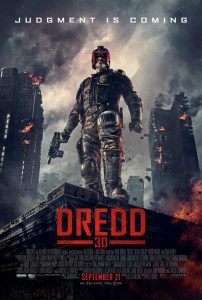

The Hollywood Movie Factory has turned out another flick, helping to satiate the demand for competent but uninspired action vehicles conveniently forgettable enough not to take up valuable cerebral RAM for the long-term. This one is called Dredd 3D and is based on the same source material that spawned the Stallone production some years ago. I hardly remember the previous version, and I fully expect to have difficulties recalling the present one when, in a decade or two, they remake it. More interesting than the movie, however, are all the libertarian points it makes without any indication that it means to.
In the future, the United States has become an irradiated wasteland, save for a megacity that stretches from old Boston to old DC. A place of squalor and, one suspects based on general living conditions, a robust welfare state, 800 million inhabitants huddle together inside its protective walls, trying to eke out an existence while spawning the occasional mutant.
There are gigantic living centers hundreds of stories high where like classes of people are housed. These massive structures have all the hallmarks of government housing, from a disinterested janitorial staff to poorly maintained and infrequently cleaned premises to homeless squatters claiming filthy nooks and crannies. As one would expect, drug lords dominate in these neglected mini-cities.
Judge Dredd, a member of the police/military class, has the legal privilege to apprehend, try, and punish on his own authority. He takes a student out with him for a day, a young woman who cannot manage a passing grade at the academy but whose mutant psychic powers make her highly desirable for the force. In answering a police call, they enter Peach Trees, the name of one of the gigantic living complexes, and arrest a prominent member of a powerful drug gang. The local drug lord, fearing what information her subordinate will give away when he is interrogated, locks down the building and tries to eliminate the judges.
[continue reading…]
Help Promote Prometheus Unbound by Sharing this Post


















